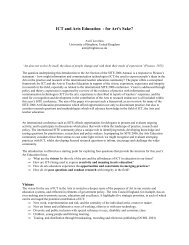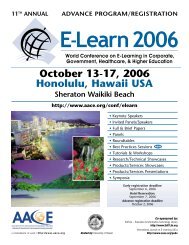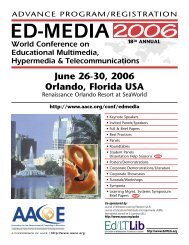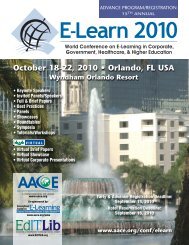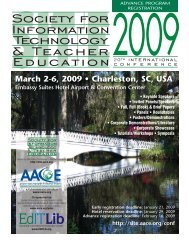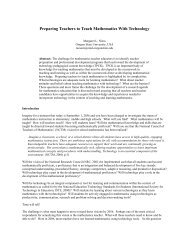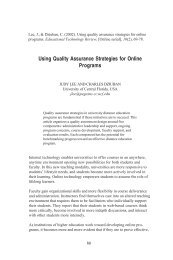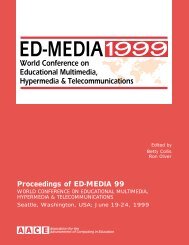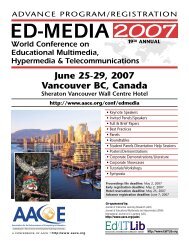ED-MEDIA 1999 Proceedings Book - Association for the ...
ED-MEDIA 1999 Proceedings Book - Association for the ...
ED-MEDIA 1999 Proceedings Book - Association for the ...
Create successful ePaper yourself
Turn your PDF publications into a flip-book with our unique Google optimized e-Paper software.
Re-engineering <strong>the</strong> MBA<br />
Using Virtual Seminars<br />
Drew Parker Vivian Rossner-Merrill Rob McTavish<br />
Faculty of Business Administration LohnLab <strong>for</strong> Teaching Technologies LohnLab <strong>for</strong> Teaching Technologies<br />
parker@sfu.ca rossner@sfu.ca mctavis@sfu.ca<br />
Simon Fraser University<br />
Burnaby, British Columbia, Canada<br />
Introduction and Overview:<br />
Universities are increasingly subscribing to <strong>the</strong> notion of executive education, lifelong learning, and program profitability<br />
largely as a result of decreased public funding and greater public demands <strong>for</strong> accountability. At <strong>the</strong> same time, novel<br />
technologies are starting to prove effective <strong>for</strong> <strong>the</strong> delivery of remote full or part-time programs. Schools are now starting to<br />
offer unique programs that are quickly becoming global through novel delivery methods. Strategic alliances have been<br />
<strong>for</strong>med and new technologies employed and <strong>the</strong> resulting increased competition between educational institutions underscores<br />
<strong>the</strong> necessity to re-engineer existing programs to meet learning needs that may span a lifetime. The purpose of this paper is to<br />
present a case exemplar describing how one university re-engineered its MBA program. Our challenge was to design a single<br />
set of courses that would serve <strong>the</strong> different needs of both students and working professionals. The goal was to develop high<br />
quality and sustainable courses and program options to be offered in a highly competitive educational market place that<br />
reflects <strong>the</strong> criteria of excellence required by <strong>the</strong> University.<br />
Why Re-engineer <strong>the</strong> MBA<br />
The North American MBA market has changed dramatically in <strong>the</strong> past several years. Overall enrollments are dropping<br />
(Canadian Business), while product offerings continue to expand. Student educational demands are also expanding<br />
concomitant with new developments in educational uses of technology. Thus needs <strong>for</strong> enhanced communication among<br />
dispersed individuals and novel applications of technology led us to explore uses of computer mediated telecommunications<br />
in ways to ensure that our Business programs remain competitive with established programs available in Canada. (See, <strong>for</strong><br />
example, http://www.athabascau.ca or http://info.queensu.ca/index.html.) Thus a necessary part of re-engineering <strong>the</strong> MBA<br />
discussed here included developing high quality, sustainable courses that incorporate a range of flexible study options suited<br />
to <strong>the</strong> virtual learning environment.<br />
The concept of re-engineering has a simple premise: to look at underlying processes and consider how In<strong>for</strong>mation<br />
Technology can support a redesigned methodology. It has come to mean change in almost any <strong>for</strong>m, but continues to reflect<br />
changed business processes. The MBA degree is a suitable candidate <strong>for</strong> re-engineering today due to increased pressure <strong>for</strong><br />
shortened delivery times, remote locations access, and <strong>the</strong> need to remain competitive by meeting <strong>the</strong> variable knowledge<br />
needs of students in different workplace situations. These include management development seminars, executive diploma<br />
programs, focussed Masters programs, like a Master of Technology, and specialized Master's programs designed <strong>for</strong> target<br />
client groups like nurses, physicians, dentists, agriculturists, financiers, or entrepreneurs. To design programs that allow <strong>for</strong><br />
incorporation of <strong>the</strong> range of desirable options, one must study a particular program's underlying processes, including target<br />
clientele, timing, method of delivery, and desirability of change. Making programs available while students remain in <strong>the</strong><br />
workplace precludes disruption of workflow, salary and benefits, and reduction in required residence time <strong>for</strong> students. O<strong>the</strong>r<br />
advantages include considerable cost reduction <strong>for</strong> corporate sponsored study, allowances <strong>for</strong> <strong>the</strong> reusability of course<br />
materials <strong>for</strong> in-house professional training and upgrading of personnel.<br />
Modularizing <strong>the</strong> Business Program:<br />
University graduates who move into a management role often look to executive programs to upgrade <strong>the</strong>ir management<br />
acumen. Our starting point, <strong>the</strong>re<strong>for</strong>e, was to target working professionals who ei<strong>the</strong>r do not have business backgrounds, or if<br />
<strong>the</strong>y do <strong>the</strong>ir knowledge is outdated, who are in situations where <strong>the</strong> need <strong>for</strong> education or training in one or more business<br />
areas is highly desirable. A second targeted group comprised students who typically have recently graduated from an<br />
undergraduate program and are looking to ei<strong>the</strong>r extend <strong>the</strong>ir business education to graduate school or to acquire business<br />
education in addition to ano<strong>the</strong>r discipline, such as computing science or engineering science. To better accommodate <strong>the</strong><br />
range of prospective students’ needs, we developed a series of integrated modules that toge<strong>the</strong>r make up a Graduate Diploma<br />
Program in Business Administration (GDBA).



